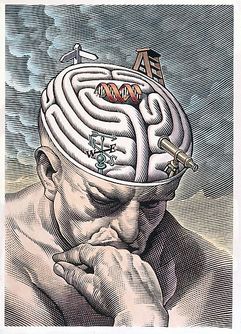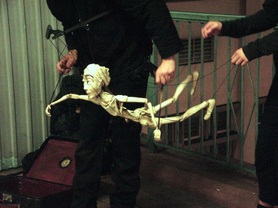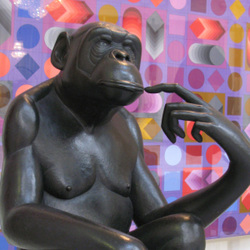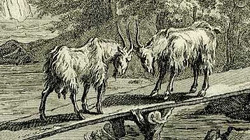(Hannibal crossing the Alps)
 A maze of choices...*
A maze of choices...* There is no absolute freedom, except in theories and dreams. You cannot disregard the given, the necessity of causes above, beyond, beneath and around your will.
In spite of this, quot Spinoza, even a stone thrust, would believe – if conscious – that it flies free [1]. Our will, particularly when we let it roam uncontrolled, has deeper roots in blind spots of the awareness. It appears that we want only what we are able to conceive. You want what you can want.
Even so, this is no reason for fatalism; in fact, smart initiative finds and creates amazing freedom, by its choices... so sad that this freedom remains unavailable to many who do not even know what they can want and what the choices are.
What is freedom, anyway?
Human freedom is not a notion of the infinite Universe, it has nothing to do with Physics and mathematics within which it does not exist; freedom is something that only makes sense when you speak about experiencing it and about its human size. Freedom is something phenomenal, experienced according to our human nature, within our environment. Or else it remains beautiful philosophy or hollow political bull. You cannot let other people measure and define criteria of how you are free or how free you are.
Practical freedom is - positively – to do something different or differently from what would happen without your choices, to act as you prefer, to do something new, to become who you want to be, to have what you desire.
Still, the freedom really yours, being your own master, is to master what you want by some criterion higher than whim. Like your values and plans, for an example. This gives manifold freedom which is indeed yours; higher liberty that doing whatever you fancy.
Negatively – and not less crucially - your freedom is not to have and suffer, not to do, to let happen, to abstain, not to become, not to be, what and who you do not want [2]. It is to have a protective space and time of safety around you.
Actually, earning how to avoid what you do not want, finds you more freedom that the triumphs by force.
*
For a living person, for you and me, the word “freedom” means nothing “in general” but only related to the variable richness and nature of actual choices one can conceive and practice. To mean something, freedom must always have a definite domain and object. Many objects being possible, in the many fields of our lives, there are many dissimilar freedoms we enjoy. We gain to size-up each instead of confusing them all.
Your freedom can be evaluated– aim by aim and field by field - by the variety and latitude of meaningful choices which you are able to conceive and make, in your mind, and in your life.
*
Multiply then the choices you consider, learn to chose to have more freedom. First in your mind, then in whatever you set to do. Use your power to create choices for other people to free them too...
If you want to read more...
------
[1] Spinoza, LETTRE XXIX. (O.P. : LXII ; C.A. : LVIII) p.59-60, in SPINOZA LETTRES, TRADUIT PAR E. SAISSET (Ed. 1842), http://www.spinozaetnous.org :
"Une pierre soumise à l’impulsion d’une cause extérieure en reçoit une certaine quantité de mouvement, en vertu de laquelle elle continue de se mouvoir … Concevez maintenant, je vous prie, que cette pierre, tandis qu’elle continue de se mouvoir, soit capable de penser, et de savoir qu’elle s’efforce, autant qu’elle peut, de continuer de se mouvoir. Il est clair qu’ayant ainsi conscience de son effort, et n’étant nullement indifférente au mouvement, elle se croira parfaitement libre et sera convaincue qu’il n’y a pas d’autre cause que sa volonté propre qui la fasse persévérer dans le mouvement. Voilà cette liberté humaine dont tous les hommes sont si fiers. Au fond, elle consiste en ce qu’ils connaissent leur appétit par la conscience, et ne connaissent pas les causes extérieures qui les déterminent. C’est ainsi que l’enfant s’imagine qu’il désire librement le lait qui le nourrit; s’il s’irrite, il se croit libre de chercher la vengeance ; s’il a peur, libre de s’enfuir. C’est encore ainsi que l’homme ivre est persuadé qu’il prononce en pleine liberté d’esprit ces mêmes paroles qu’il voudrait bien retirer ensuite quand il est redevenu lui-même; que l’homme en délire, le bavard, l’enfant et autres personnes de cette sorte sont convaincus qu’ils parlent d’après une libre décision de leur esprit, et non par un aveugle emportement." pp 59-60
[2] To understand negative and positive freedom, a good reference is Berlin, I. (1958) “Two Concepts of Liberty.” In Isaiah Berlin Four Essays on Liberty. Oxford University Press, Oxford, 1969. Note that Berlin - the philosopher who made the original notions of positive and negative liberty known - defines these two liberties differently, not as they appear in this text; for him positive freedom is the "freedom to" be one's own master, one's own instrument, a doer, at least one who takes part in governing his life; negative freedom is for Berlin to have an unobstructed space of "freedom from" obstacles, coercion, from others, so that one can act.



 RSS Feed
RSS Feed